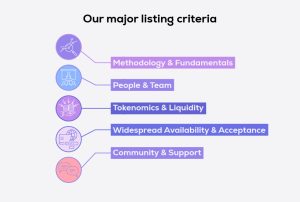Few innovations promise to reshape the world the way blockchain and Virtual Digital Assets (VDAs, popularly known as crypto) do. Decentralized, transfers value on the internet, and establishes digital ownership…crypto infuses unparalleled flexibility into finance.
Flexibility can be a double-edged sword, however. Today, more than 12,000 tokens exist. A new crypto is born nearly every day, and many of them fade as fast as they rise. Some are outright sinister: According to a report by Solidus Labs, fraudsters released over 117,000 scam tokens last year to siphon off investors’ money through rug pulls.
It is then critical to separate the wheat from the chaff. Investing in crypto should be a deliberate and well-thought decision. DYOR (Do Your Own Research)—this cannot be overemphasized.
But we do not stop there. At CoinSwitch, investor protection is of utmost priority: We equip you to do your research and enable you to invest in crypto only after we have rigorously screened it. Investing is a personal choice, and it is not our place to recommend a crypto against another, yet as a platform to discover and buy crypto for over 19 million Indians we require a token and its founding project to meet certain standards before it is listed on our platform.
Our asset onboarding team evaluates crypto on various criteria—from methodology and fundamentals to community and support—to decide if and what cryptos we should list, and when. The broad listing evaluation criteria have been detailed below this article. Do note, this is not an exhaustive list and the decision is ultimately on CoinSwitch, even if a crypto meets the below-mentioned criteria.
Further, CoinSwitch reserves the right to delist a coin if it fails to satisfy our screening and monitoring standards at any point of time.
Fundamentals & Methodology
Crypto is an umbrella term for a diverse set of projects built on a public blockchain with cryptographic technology. No crypto is like the other—each serves a different purpose. And some none at all.
CoinSwitch closely evaluates each token, its whitepaper, and other relevant documents, to assess what its use-case is, what the project intends to solve and the roadmap defined to achieve the same.
Further, CoinSwitch has taken a conscious decision to not list any privacy coins.
People & Team

A whitepaper alone cannot paint a true picture of the potential of a crypto. The people developing the token, their expertise and credibility in the Web3 space, and the investors backing them—if any—matter just as much as technical details.
Tokenomics & Liquidity
The supply and distribution of tokens have the utmost impact on the market value of a crypto asset. We evaluate a crypto’s declared maximum supply, circulating supply, the distribution of the tokens among the developers and investors, and their vesting period.
As a general rule, a crypto asset with an extremely low circulating supply or distribution which is highly skewed toward the developers and project investors is susceptible to fraud and thus not listed.
Widespread Availability & Acceptance
Crypto assets are volatile, and that’s a given. But a crypto can be especially volatile and susceptible to market manipulation if it is available only in a certain geography or a few exchanges. CoinSwitch does not want to expose our users to such additional risks, and therefore lists a crypto only if it is available on multiple exchanges.
Community & Support

Decentralization is incomplete without the active participation of developers and users. The more developers and community members there are to support and contribute to the upkeep of the project, the more robust its technology will be.
We also closely follow the reputation that the project has built for itself on social media, trading communities and among its user base.
These are the wider criteria we use while evaluating whether a crypto asset should be listed on our platform. CoinSwitch reserves the right to take the final decision on listing or delisting.







